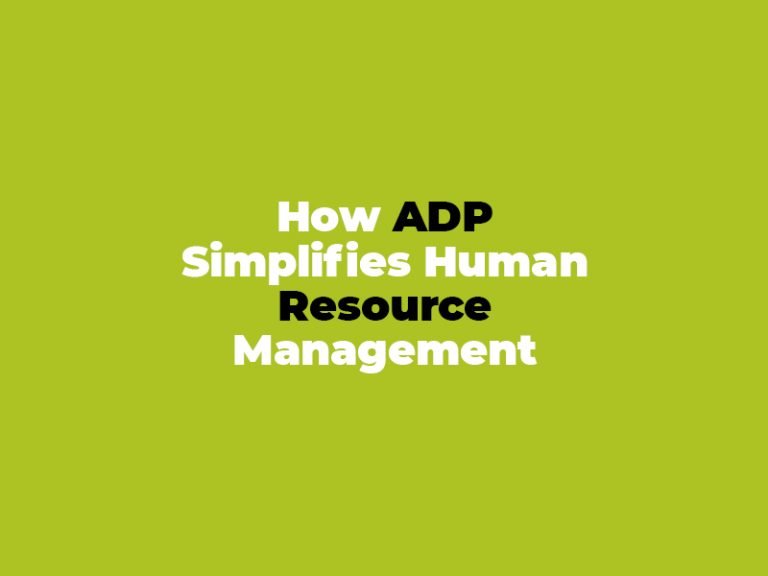In today’s digital age, securing payroll data is more crucial than ever. As businesses increasingly rely on digital systems to manage payroll, the need for robust security measures has grown.
ADP (Automatic Data Processing) is a leader in providing secure payroll solutions. This guide will explore how ADP enhances payroll security, ensuring businesses can protect sensitive employee information and comply with regulatory requirements.

Understanding Payroll Security
Why Payroll Security Matters
Payroll security is vital for several reasons:
- Protection of Sensitive Data: Payroll systems store personal and financial information, including Social Security numbers, bank account details, and salary information. Unauthorized access to this data can lead to identity theft and financial fraud.
- Regulatory Compliance: Businesses must comply with data protection laws, such as the General Data Protection Regulation (GDPR) and the Health Insurance Portability and Accountability Act (HIPAA). Non-compliance can result in hefty fines and legal consequences.
- Maintaining Trust: Employees trust their employers to handle their personal information with care. Breaches in payroll security can erode this trust, leading to decreased employee morale and potential turnover.
Common Payroll Security Threats
Payroll systems are susceptible to various threats, including:
- Phishing Attacks: Fraudsters use deceptive emails to trick employees into revealing login credentials or other sensitive information.
- Malware and Ransomware: Malicious software can infiltrate payroll systems, stealing data or locking systems until a ransom is paid.
- Insider Threats: Disgruntled or dishonest employees may misuse their access to payroll systems to steal information or commit fraud.
- Data Breaches: Cybercriminals can exploit vulnerabilities in payroll systems to gain unauthorized access to sensitive data.
ADP’s Commitment to Payroll Security
ADP is committed to providing secure payroll solutions, employing a multi-layered approach to protect sensitive information. Here are the key components of ADP’s payroll security strategy:
Advanced Encryption
ADP uses advanced encryption technologies to protect data both in transit and at rest. Encryption ensures that even if data is intercepted, it cannot be read or misused by unauthorized individuals.
Data in Transit
When data is transmitted between systems or over the internet, ADP employs Secure Socket Layer (SSL) and Transport Layer Security (TLS) protocols. These protocols encrypt data, preventing unauthorized access during transmission.
Data at Rest
Data stored on ADP’s servers is encrypted using Advanced Encryption Standard (AES) with 256-bit keys. This level of encryption is highly secure and widely used by government agencies and financial institutions.
Multi-Factor Authentication (MFA)
ADP employs multi-factor authentication (MFA) to add an extra layer of security to its payroll systems. MFA requires users to provide two or more verification factors to gain access to the system, reducing the risk of unauthorized access.
Types of MFA
- Something You Know: A password or PIN.
- Something You Have: A smartphone or hardware token.
- Something You Are: Biometric verification, such as a fingerprint or facial recognition.
By requiring multiple forms of authentication, ADP ensures that even if one factor is compromised, unauthorized access is still unlikely.
Regular Security Audits and Assessments
ADP conducts regular security audits and assessments to identify and address potential vulnerabilities in its systems. These audits include:
- Internal Audits: Conducted by ADP’s security team to ensure compliance with internal security policies and procedures.
- External Audits: Performed by independent third-party auditors to verify that ADP’s security practices meet industry standards and regulatory requirements.
Employee Training and Awareness
ADP recognizes that employees are often the first line of defense against security threats. To ensure its workforce is well-prepared to handle security challenges, ADP provides comprehensive training and awareness programs.
Security Awareness Training
Employees receive regular training on topics such as:
- Recognizing phishing attempts
- Safe browsing practices
- Secure handling of sensitive information
Incident Response Training
ADP employees are trained to respond quickly and effectively to security incidents, minimizing the impact of potential breaches.
Secure Software Development Lifecycle (SDLC)
ADP follows a Secure Software Development Lifecycle (SDLC) to ensure that security is integrated into every stage of software development. This approach includes:
- Threat Modeling: Identifying potential security threats and designing solutions to mitigate them.
- Code Reviews: Conducting thorough reviews of code to identify and address security vulnerabilities.
- Security Testing: Performing rigorous security testing, including penetration testing and vulnerability scanning, to ensure software is secure before deployment.
Data Backup and Disaster Recovery
ADP has robust data backup and disaster recovery plans in place to ensure business continuity in the event of a security incident or natural disaster.
Regular Data Backups
ADP performs regular backups of payroll data to secure, offsite locations. These backups are encrypted and can be quickly restored in the event of data loss.
Disaster Recovery Planning
ADP’s disaster recovery plan includes detailed procedures for restoring systems and data following a security incident or natural disaster. This plan is regularly tested and updated to ensure its effectiveness.
Compliance with Industry Standards and Regulations
ADP adheres to stringent industry standards and regulatory requirements to ensure its payroll solutions are secure and compliant.
SOC 1 and SOC 2 Reports
ADP undergoes annual audits to obtain SOC 1 and SOC 2 reports, which verify that its controls meet industry standards for security, availability, processing integrity, confidentiality, and privacy.
GDPR and HIPAA Compliance
ADP’s payroll solutions are designed to comply with data protection laws such as GDPR and HIPAA, ensuring that businesses can meet their regulatory obligations.
Also Read: How ADP Simplifies Human Resource Management
Benefits of ADP’s Secure Payroll Solutions
Protecting Sensitive Employee Information
By employing advanced security measures, ADP ensures that sensitive employee information is protected from unauthorized access and breaches. This protection helps businesses maintain employee trust and comply with data protection regulations.
Reducing the Risk of Fraud
ADP’s multi-factor authentication and regular security audits reduce the risk of payroll fraud. By ensuring that only authorized individuals can access payroll systems, ADP helps businesses safeguard their financial information.
Ensuring Business Continuity
ADP’s robust data backup and disaster recovery plans ensure that businesses can quickly recover from security incidents or natural disasters. This continuity is crucial for maintaining operations and minimizing downtime.
Enhancing Compliance
ADP’s commitment to compliance with industry standards and regulations ensures that businesses using its payroll solutions can meet their legal obligations. This compliance reduces the risk of fines and legal consequences associated with data breaches.
Improving Employee Confidence
When employees know that their personal and financial information is secure, they are more likely to trust their employer and feel confident in the company’s payroll processes. This confidence can lead to increased employee satisfaction and retention.
Best Practices for Maximizing Payroll Security with ADP
While ADP provides robust security measures, businesses can take additional steps to maximize payroll security:
Implement Strong Password Policies
Encourage employees to use strong, unique passwords for accessing payroll systems. Regularly update password policies to require complex passwords and periodic changes.
Educate Employees on Security Practices
Provide ongoing security training to employees, emphasizing the importance of recognizing phishing attempts, safe browsing, and secure handling of sensitive information.
Limit Access to Payroll Systems
Only grant access to payroll systems to employees who need it to perform their job duties. Regularly review access permissions and revoke access for employees who no longer require it.
Monitor Payroll Activity
Regularly monitor payroll activity for unusual or suspicious behavior. Implement automated alerts for potential security incidents, such as multiple failed login attempts or changes to employee bank account information.
Conduct Regular Security Audits
In addition to ADP’s audits, conduct your own regular security audits to identify and address potential vulnerabilities in your payroll processes.
Final Thoughts
Payroll security is a critical aspect of modern business operations. By leveraging ADP’s secure payroll solutions, businesses can protect sensitive employee information, reduce the risk of fraud, ensure business continuity, enhance compliance, and improve employee confidence.
ADP’s multi-layered approach to payroll security, including advanced encryption, multi-factor authentication, regular security audits, employee training, secure software development, and robust data backup and disaster recovery plans, provides businesses with the tools they need to safeguard their payroll systems.
By following best practices and partnering with a trusted provider like ADP, businesses can maximize payroll security and focus on their core operations with confidence.





